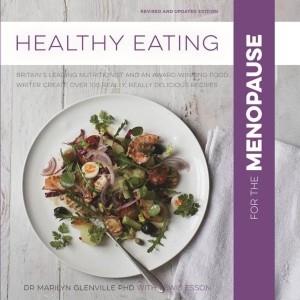Menopause

Women are programmed to dwell on loss – the loss of periods, the loss of the ability to create life, the loss of hormones, the problems of the ’empty-nest’ syndrome. In other societies, this time in a woman’s life is seen as one of gain, a time of great wisdom. A time when the emphasis shifts away from doing the chores, working in the fields, to the role of lawmaker and counsellor to younger couples, where maturity and experience make a significant and valuable contribution to the family and society.
What happens at the menopause?
At the menopause women literally run out of eggs. Each woman has a supply of eggs (approximately 2 million) from the moment she is born and over the years they are used up and die off. She finally reaches a certain age when there simply aren’t any more. What the body does then to try to get that woman to ovulate is to release the hormone FSH. This hormone is released every month in a normal cycle but during the menopause, a woman’s body registered that ovulation is not taking place, so even more FSH is pumped out.
The interesting thing is that as the ovaries decline their production of oestrogen, nature has something else up her sleeve. We are also able to produce a form of oestrogen (called oestrone) from our adrenal glands in order to compensate for the decline from the ovaries.
We also produce oestrogen from fat cells, so being ultra-slim will not have health benefits in the long run, particularly if you are going through menopause. Overweight isn’t the answer, either, but from an oestrogen-production point of view, you are better off being slightly overweight than slim.
What are the symptoms?
These vary from woman to woman. Some women sail though the menopause without any symptoms and the only thing they notice is that their periods have stopped. Some of the women I have seen in my clinic report being completely drenched in sweat day and night, and getting up to change their night clothes two or three times a night, or even taking a shower in the middle of the night.
Symptoms of the menopause can include hot flushes, night sweats, vaginal dryness, mood swings, declining libido, osteoporosis, ageing skin, lack of energy, joint pains, weight gain, headaches and changes in hair quality. Interestingly, men also experience a lot of these symptoms, with irritability, a declining libido, changes in weight, ageing skin and hair, depression and anxiety. These symptoms are apparently part of the Western ageing process for both men and women, so it’s important not to blame every symptom that you experience on the menopause.
What are your choices?
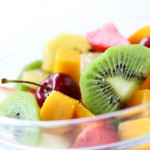
There are a variety of other health conditions that throw up symptoms that are similar to those of the menopause, so don’t assume – or, more importantly, let your doctor convince you – that there may not be another cause. What’s important is working out what symptoms are due to the menopause, and what are simply symptoms of ageing.
The natural treatment programme below aims to encourage optimum health, so that your body can manage this natural event with ease. In this section you will find a Plan of Action with a detailed summary of how you can plan your own treatment.
Dietary changes
A well-balanced diet is essential during the menopause as it enables the body to adjust automatically to the hormone changes, naturally maintaining oestrogen from the adrenal glands and fat deposits.
Phytoestrogens
One of the questions that most perplexes scientists is why and how the menopause is experienced so differently around the world. There are other cultures where women experience minimal and often no menopausal symptoms. Also linked to this issue is the fact that in some parts of the world, notably the Far East, breast cancer is not the major killer that it is here in the West. For example, the UK seems to have a breast cancer death rate that is about six times higher than that of women in Japan. The interesting thing is that as soon as Japanese women move to the West their breast cancer rate is the same.
As a result of this observation, scientists have begun to study the benefits of a group of plant hormones known as phytoestrogens. These hormones naturally occur in certain foods such as soya. Soya contains two flavonoids, genistein and daidzein, and studies have shown that they are chemically similar to Tamoxifen, which is the drug used to prevent a recurrence of breast cancer.These very weak plant oestrogens latch on to the oestrogen receptors in the breast and they stop the more powerful carcinogenic oestrogens getting through. So they have a protective effect, as well as helping to balance hormones, which are responsible for menopausal symptoms such as hot flushes. Phytoestrogens have also been studied extensively for their effect on lowering cholesterol, so they can have protective effects in terms of heart disease, which is important around the menopause. Phytoestrogens can include soya (fermented is best), hops, dandelion, red clover, sage, alfalfa, flaxseeds.
Bioidentical Hormones
These are hormones that are chemically similar in structure to the hormones your body would produce naturally, so this could include oestradiol, oestriol, testosterone, progesterone or even other hormones like DHEA. In this way, they are considered more ‘natural’ than the synthetic versions used in many HRT drugs.
But to be clear from the outset, these hormones are still made in a laboratory in the same way that conventional HRT would be made and from the same sources. Would I personally consider bio-identical hormones a ‘natural solution’? Definitely not, for a number of reasons.
Firstly, these are hormones just as in HRT except that that they are marketed as having a molecular structure similar to your own. No matter what stage of the menopause you are in, by replacing hormones that are naturally decreasing, you are basically telling your body that its natural rhythm is ‘wrong’ and that this decline should not be happening.
Secondly, when would you stop taking them? If it were indeed correct to replace these naturally declining hormones then you would need to take them forever. And indeed, some women think it is fine to take these hormones indefinitely.
Thirdly, these are still hormones and in my opinion, should be on prescription like any drug and in the UK are classed as unlicensed medications. Adding back these hormones requires a judgement as to which hormone you need and in what dose or combination with other hormones. Hormone levels would still need to be adjusted as you go through the different stages because of their individual nature.
It could be assumed that bioidentical hormones may carry a lesser risk of breast cancer and other risks than conventional HRT but there are no randomised controlled trials to show this.
Also in Australia a number of cases of womb cancer from using bioidentical hormones have been noted.
There is no scientific agreement on the dosages, combinations, and length of time that you use these bioidentical hormones. Don’t get sucked in by the hype and the celebrity endorsements. You are using yourself as a guinea pig. These are not natural products, these are drugs and they are unlicensed.
Supplements
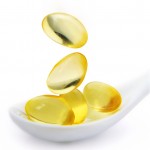
Vitamin C
Vitamin C is known for its beneficial effect on the immune system, strengthening blood vessels and also for its role as an antioxidant in the body. So not only is Vitamin C important for preventing illness, and for encouraging your health in general, but it also has specific benefits at the menopause. Giving women vitamin C with bioflavonoids has been shown to help reduce hot flushes.
Vitamin C helps to build up collagen which gives skin its elasticity and it is therefore helpful in the prevention and treatment of vaginal dryness (which can cause discomfort when the vagina loses some of its ‘stretch’). It can also help retain the elasticity in the urinary tract and so prevent leakage or stress incontinence, which is common at the menopause. Collagen is also important for your bones.
Vitamin E
This is an important vitamin to consider at the menopause. Over many years clinical studies have shown its effect on reducing hot flushes. Vitamin E is also helpful for vaginal dryness and one study showed that just 400iu taken daily for between 1 and 4 months helped 50 percent of the women given supplemental vitamin E.
Although most women fear breast cancer, our biggest killer is heart disease. There is now such a wealth of information on the beneficial effects of nutrition on heart disease and unfortunately HRT has been shown to increase the risk of heart attacks and strokes. A study published in the Lancet showed that 2000 patients with arteriosclerosis (fatty deposits in the arteries) had a 75 percent reduction in their risk of heart attack when given vitamin E. At the time, researchers claimed that vitamin E was even more effective than aspirin in reducing heart attacks.
B Vitamins
These are called the ‘stress’ vitamins because they are enormously beneficial when you are under a great deal of pressure. Symptoms of B-vitamin deficiency include anxiety, tension, irritability and poor concentration. Therefore, supplementing them in the form of a good B-complex supplement can be useful if you have any of these symptoms of stress. During the menopause it is extremely important that you give your adrenal glands (which will be called into action to produce oestrogen) a break. B vitamins will help to do this. They can also be useful if you are suffering from reduced energy levels.
Omega 3 Fatty Acids
Signs of an Omega 3 fatty acid can include dry skin, lifeless hair, cracked nails, fatigue, depression, dry eyes, lack of motivation, aching joints, difficulty in losing weight, forgetfulness, breast pain – all symptoms that could be ‘blamed’ on the menopause. If you have also tried to lose weight by going on a low-fat or no-fat diet, you are likely to be deficient in these essential fats. They need to be supplemented around the menopause because they can help with many of the symptoms. Furthermore, because they help to ‘lubricate’ the body in general, they can help with vaginal dryness. It is now estimated that we are getting ten times more Omega 6 fats from our diet than Omega 3 and over the last century there has been an 80% decrease in the consumption of these Omega 3 fatty acids. When you eat Omega 3 fats they are converted to substances that have an anti-inflammatory effect on the body.
Many of the women I see in the clinic have been taking evening primrose oil supplements – an Omega 6 fatty acid – for years and have not been eating enough Omega 3 oils, or taking them in supplement form, to counterbalance this. Some women are also taking combinations such as Omega 3, 6, and 9 in supplement form because they have heard that we need a good balance of all the Omega fatty acids. This is true, but you have to take into account what your own levels may be in the first place. It is no good adding in more Omega 6 if you have already got enough or in fact too much in your body. (You can now have a blood test to tell you if you have the correct levels of Omega 3 to Omega 6 in your body see below). To check whether you have sufficient levels of Omega 3 please click Omega 3 Deficiency Test (at home finger prick blood)
Magnesium
This is an important mineral for your bones at the menopause so it is important that you have enough in your body. Magnesium is also known as ‘nature’s tranquilliser’, so it will help with symptoms such as anxiety, irritability and other mood changes.
Calcium
Not only do we need good levels of calcium for our bones, teeth, nails and hair, but also for healthy heart rhythm and blood pressure. It is also needed for normal blood clotting, for muscle contraction and relaxation and proper functioning of the nervous system.
Vitamin D
We know that Vitamin D is required for calcium absorption, but it also plays many other important roles including prevention of cancer, especially breast cancer, heart disease, Type 2 diabetes and osteoporosis. As well as all of these benefits, it is now thought that having good levels of vitamin D can help slow down the ageing process and low levels have been implicated in autoimmune diseases such as rheumatoid arthritis, lupus and inflammatory bowel disease. To check whether you have sufficient levels of Vitamin D please click Vitamin D Deficiency Test (at home finger prick blood test) Furthermore, by adopting a healthier lifestyle you will be more likely to go through the menopause comfortably which is discussed in detail in the rest of this ebook which you can read by clicking on Understanding the Menopause ebook at The Natural Health Practice
Herbs

Black Cohosh (Cimicifuga racemosa)
This is the herb of choice for the menopausal symptoms of hot flushes and night sweats and there have been a number of good clinical trials that show its effectiveness. Also if you are getting mood swings and anxiety then black cohosh can also be helpful for these symptoms of the menopause.
Black cohosh does not increase oestrogen levels and has no effect on the cells in the vagina or womb. This is important because this is where the risks are with HRT in that it increases oestrogen levels and stimulates tissue in various places in the body including the womb and breast and therefore can increase the risk of cancer. You can therefore be assured that it offers relief from menopause symptoms without oestrogen-like effects.
So how is black cohosh working on the menopausal symptoms if it is not having an oestrogenic effect? It is actually working as a SERM (selective oestrogen receptor modulator). These are substances that can stimulate oestrogen receptors in some parts of the body and not others. So they can block stimulation in places like the womb and breast where it would be unsafe to have cells over-stimulated but they can stimulate oestrogen receptor in other places where you would want stimulation such as the bones and brain. These SERMS are then able to target cells appropriately rather than the HRT approach, which is just to replace hormones.
SERMS are the new drug alternatives to HRT but nature already supplies us with SERMS in the form of black cohosh and foods like phytoestrogens.
And what about some adverse effects on the liver that you read about in the press a while back?
A couple of years ago there were concerns about black cohosh and liver disease. This problem is extremely rare and there have only been four complaints compared to the estimated 9 million treatment days (as it is termed) purchased each year.
When the European Medicines Agency (EMEA), reviewed all the evidence worldwide, it concluded that it was not clear whether black cohosh caused the problem. The National Institutes of Health in the US believes there’s no case to answer and they have stated that black cohosh has few side effects and that ‘liver damage has been reported in a few individuals using black cohosh, but millions of people have taken the herb without apparent adverse health effects. There is no scientific evidence to show that the herb causes liver damage.’
Agnus Castus (Vitex agnus castus)
This herb is classed as an adaptogen as it has a balancing effect on your hormones. It works on the pituitary gland which is the gland that sends the message down to the ovary to release hormones. Agnus castus can help increase certain hormones if they are too low and decrease them if too high. This is particularly helpful in the perimenopause years because your hormones can be fluctuating widely and this herb helps to create a kind of stability. It is also the best herb to take if you are getting mood swings, anxiety and tension.
Dong Quai (Angelica sinensis)
Dong quai is a herb from Traditional Chinese Medicine and is helpful for both the hot flushes and night sweats. It has a long history of traditional use. Research has shown that it not only starts to help reduce the hot flushes and night sweats in one month but it is also helpful for fatigue and disturbed sleep.
Sage (Salvia officinalis)
This herb,which is also easily used as a tea, is helpful in controlling both the hot flushes and night sweats.
Milk thistle (Silymarin marianum)
Again in any situation where you are aiming to balance the female hormones it is so important to add in herbs which can improve liver function. It is your liver that is doing the hard work of detoxifying your hormones so you want to make the job as easy as possible.
Ginkgo Biloba
As we get older, both men and women can find that their memory and concentration is not as good as it was. This is often a problem to do with age rather than hormones. The herb ginkgo biloba has been found to generally have a rejuvenating effect on the brain. A number of clinical trials have shown that it improves learning ability, memory and concentration. Studies are also being undertaken at present to establish whether gingko may slow down the progression of Alzheimer’s disease. Caution You should not take any of the above herbs if you are taking, The Pill, Fertility drugs, HRT or any other hormonal treatment or other medication unless they are recommended by a registered, experienced practitioner.
Tests
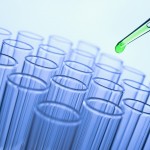
Mineral Deficiency Test with Supplement Programme (Hair) Find out what the mineral and heavy toxic levels are in your body
This test measures the deficiencies and excess levels of 12 different minerals (including calcium, chromium, cobalt, copper, iron, magnesium, manganese, phosphorus, potassium, selenium, sodium and zinc) and 6 heavy toxic metals (including aluminium, arsenic, cadmium, lead, mercury and nickel) that may be present in your body. Find out more – Mineral Deficiency Test with Supplement Programme (Hair) Online Personalised Supplement Assessment Programme Discover what vitamins and minerals you need and should be taking
The analysis of this comprehensive questionnaire will give you a three monthly supplement programme to help balance any vitamin and mineral deficiencies you may have. Find out more – Online Personalised Supplement Assessment Programme Osteoporosis Bone Turnover Test (Urine) Find out how healthy your bones are
This simple urine test, (which is collected at home), measures how much your bone is turning over i.e. the rate at which you might be losing bone. Find out more – Osteoporosis Bone Turnover Test (Urine) Vitamin D Deficiency Test (at home finger prick blood test) With all the news in the press about the benefits of having good levels of vitamin D e.g. prevention of cancer, especially breast cancer, heart disease, Type 2 diabetes and osteoporosis it is important that you know whether or not you are lacking in this vital vitamin.
We know that Vitamin D is required for calcium absorption, but it also plays many other important roles including prevention of cancer, especially breast cancer, heart disease, Type 2 diabetes and osteoporosis. As well as all of these benefits, it is now thought that having good levels of vitamin D can help slow down the ageing process and low levels have been implicated in other autoimmune diseases such as rheumatoid arthritis, lupus and inflammatory bowel disease. To check whether you have sufficient levels of Vitamin D please click Vitamin D Deficiency Test (at home finger prick blood test) Omega 3 Deficiency Test (at home finger prick blood) If you want to find out if you are getting enough Omega 3 fatty acids from your diet and whether you have the correct balance of essential fatty acids.
Signs of an Omega 3 fatty acid are dry skin, lifeless hair, cracked nails, fatigue, depression, dry eyes, lack of motivation, aching joints, difficulty in losing weight, forgetfulness, breast pain. If you have also tried to lose weight by going on a low-fat or no-fat diet, you are likely to be deficient in these essential fats. It is now estimated that we are getting ten times more Omega 6 fats from our diet than Omega 3 and over the last century there has been an 80% decrease in the consumption of these Omega 3 fatty acids. When you eat Omega 3 fats they are converted to substances that have an anti-inflammatory effect on the body.
Many of the women I see in the clinic have been taking evening primrose oil supplements – an Omega 6 fatty acid – for many years as it can be helpful with PMS. But you can end up with too much Omega 6 and not enough Omega 3 in your body. Some women are also taking combinations such as Omega 3, 6, and 9 in supplement form because they have heard that we need a good balance of all the Omega fatty acids. This is true, but you have to take into account what your own levels may be in the first place. It is no good adding in more Omega 6 if you have already got enough or in fact too much in your body. (You can now have a blood test to tell you if you have the correct levels of Omega 3 to Omega 6 in your body see below). To check whether you have sufficient levels of Omega 3 please click Omega 3 Deficiency Test (at home finger prick blood) After three months you would then have a re-test in order to monitor your progress and adjust your supplement programme according to your new condition.
If you need help in obtaining any of the supplements, herbs or tests mentioned above, click, Menopause options at The Natural Health Practice. They can supply all of them for you online or if you prefer to talk to somebody first you can also order by mail order on the telephone. The products supplied by this company are always of the highest quality.
Plan of Action
Nutrition
Ensure you are getting the right nutrition.Follow the dietary recommendations outlined in the free The Foundation of Health ebook For more information on the special dietary recommendations for menoapuse, read the rest of the Understanding Menopause ebook at The Natural Health Practice
Supplements
The supplement programme below should be taken for at least three months in order to achieve best results
Nutrients & amounts
| A good multi-vitamin & mineral supplement | Magnesium citrate | 340mg (55mg elemental) | |
| B Vitamins | 25mg | Vitamin C | 1000mg |
| Vitamin E (as d-alpha tocopherol) | 54mg | Calcium Citrate | 670mg (142mg elemental) |
| Vitamin D | 300ius | Omega 3 fish oils | (providing 770mg EPA and 510mg DHA) |
To avoid having to purchase numerous supplements for all of the above and to make the process easier, I have put together a supplement programme which contains all the nutrients mentioned above and in the correct dosages. For more information about these click Menopause Supplement Programme. In my book ‘Natural Solutions to the Menopause’ I explain the impact of nutrition on the menopause and also give in great detail a list of the most important nutrients and herbs required in order to help you.
If you would like to order these special supplements now, you can do so through the Natural Health Practice by clicking Menopause supplements at the Natural Health Practice.
HerbsA good herbal formula should contain: |
Herbs & amounts
|
||||||||||
| At the end of three months you should reassess your condition and adjust your supplement programme accordingly. | |||||||||||
Tests
The tests below have been specially selected to be the most helpful if you are concerned about the menopause. Mineral Deficiency Test with Supplement Programme (Hair) Online Personalised Supplement Assessment Programme Osteoporosis Bone Turnover Test (Urine) Vitamin D Deficiency Test (at home finger prick blood test) Omega 3 Deficiency Test (at home finger prick blood) After three months you would then have a re-test in order to monitor your progress and adjust your supplement programme according to your new condition.
If you need help in obtaining any of the supplements, herbs or tests mentioned above, click, Menopause options at The Natural Health Practice. They can supply all of them for you online or if you prefer to talk to somebody first you can also order by mail order on the telephone. The products supplied by this company are always of the highest quality.
Read More
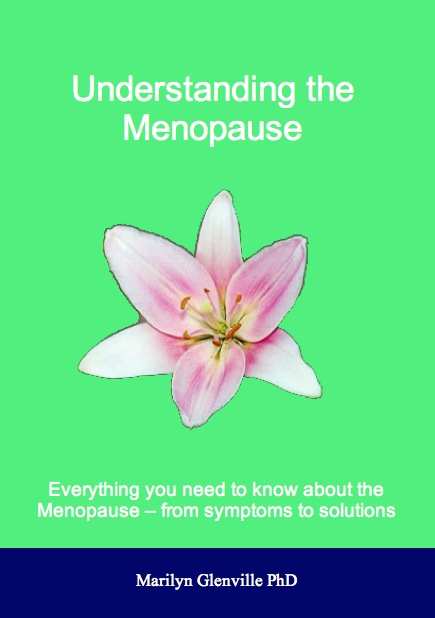
At the end of the ebook is a practical step by step summary of what you can do to help yourself.
If you would like to read the rest of this ebook click, Understanding Menopause ebook at The Natural Health Practice and you will be given details of how you can download the whole ebook.
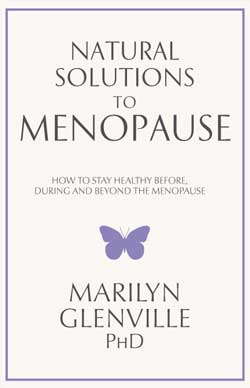
The contents of this site are for information only and are intended to assist readers in identifying symptoms and conditions they may be experiencing. This site is not intended to be a substitute for taking proper medical advice and should not be relied upon in this way. Always consult a qualified doctor or health practitioner, especially if you are pregnant, taking the pill or on any medication. Your situation will need to be looked at individually and you should not attempt to self treat. The author and publisher cannot accept responsibility for illness arising out of the failure to seek medical advice from a doctor.
The views expressed by third parties placing material on these pages are not representative of the views of the author or publisher. The Author and Publisher cannot monitor the content not produced by us and has not reviewed all the third party material published on this site and the Author and Publisher accept no liability whatsoever in relation to the content of third party material placed on these pages.


